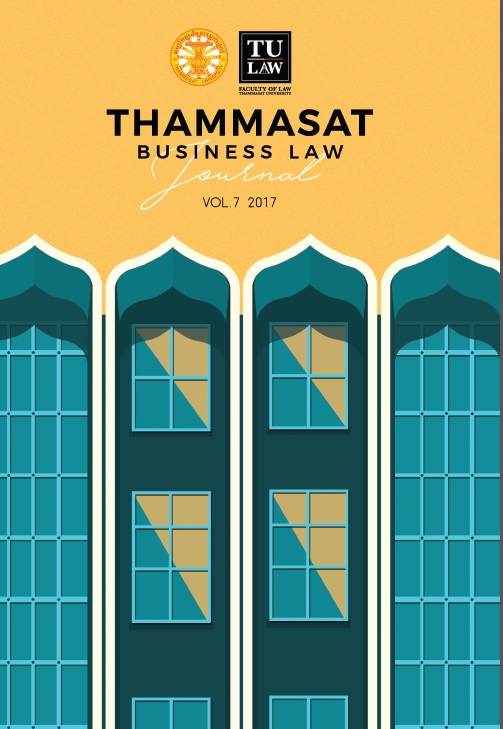CLASS ACTION IN COMPETITION LAW: THE PROBLEMS OF COUNSELS FOR PLAINTIFF
Main Article Content
Abstract
It is widely known that the concept of class action in competition law was later on promoted in various legal systems of different countries including the United States of America and European countries where ‘class action’ has been most commonly practiced. One of the most well-known and significant class actions was the lawsuit against Microsoft which not only resulted in recoveries for all parties including the plaintiffs, the defendant and other involved persons but also contributed great benefits to the economy of the country.
A trade competition case in the form of a class action in Thailand is practicable since Thai law on class action is part of the amendment of the Civil Procedure Code of Thailand B.E.2558. Nevertheless, it still lacks specific proceedings to effectively regulate the legal measures in class action in competition law, and there has been few cases based on class action law. The class action law introduced new legal proceedings and an innovative way to litigate competition cases in Thailand. The drawback to this new law is its lack of precedent and unclear application of laws.
The significant problem is the person representing the plaintiff because they play a crucial role in the commencement of class action proceedings. According to Section 222/1 of the Civil Procedure Code, only “injured persons” are entitled to file a class action lawsuit against the defendant. Thus, it is not clear whether the Consumer Protection Board and public prosecutors shall be regarded as “Class” or “Plaintiff’s Lawyer” pursuant to Section 222/12(5) since they are not the injured person. Consequently, the compensation for Consumer Protection Board and public prosecutors can also raise conflict of interest issue because Section 222/37 of the Civil Procedure Code allows the plaintiff’s lawyer to receive up to 30 percent of the total award received by the plaintiff and its members. However, the governmental officers cannot receive extra compensation other than their salary.
Additionally, the author is also concerned whether Thai legal culture would be able to cope with the influence of the American legal culture of the class action because class action proceedings work best when the individuals involved in the lawsuit are well-equipped with the knowledge and resources necessary for initiating a class action in competition law.
This article will focus on the issues of legal standing of the Consumer Protection Board, the legal standing of Public Prosecutors, and Representation of the Plaintiff by Private Lawyer; and the proposal for solution for those problems to deliver its utmost benefit.
Article Details
References
Ardhawat Ingkaranuwat. “The role of lead counsel for the plaintiff in class action.” Master’s thesis, Faculty of law Durakij Bundit University, 2006.
Judge Eearn Kunkaew. “Class action and Writ of certiorari.” Winyuchon, 2016
Gene R. Shreve and Peter Raven-Hansen, Understanding Civil Procedure.
Second Edition. Legal Text Series. Times Mirror Boaks. 2004.
Harald Koch, Group and Representative Action in West German Civil Procedure.
Erik Jayme. Ed 1990.
Korravee Sonvoravongsa. “Class action for Initial Public Offering of Securities.” Master’s thesis, Durakij Bundit University, 1999.
Namtae Meeboonsalang. “Class action in environment cases” Master’s thesis, Faculty of law Chulalongkorn University, 2004
Prof. Phiroj Wayuphap. “The explanation on civil procedure (Class action).” Siam publishing, 2016.)
Wancharee Sutarai. “Public prosecutor in the capacity of lead counsel for the plaintiff in class action: a study in consumer protection law and environmental law.” Master’s thesis, Durakij Bundit University, 2009.
Articles
Edward H. Cooper. ‘Class action advice in the form of question’ (2006)
Duke Journal of Comparative & International Law, vol.2
Judge Vichai Ariyanuntaka, the analysis on Class action litigation purposed to Thai council state
Other Materials
European Commission, Legal service document (2007)
Paul H. Alvarado, ‘Coordination Proceedings Special Title Rule’, (2004) Cal. 1550b
Super. LEXIS 262
Trump settles Trump University lawsuits for $25M’ (BBC News, 19 Nov 2016)


